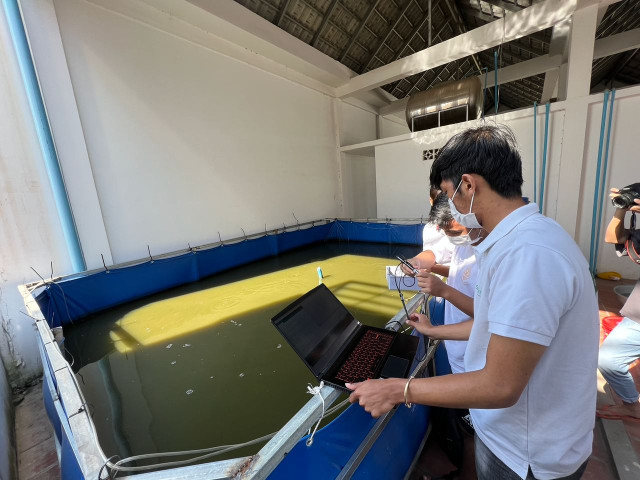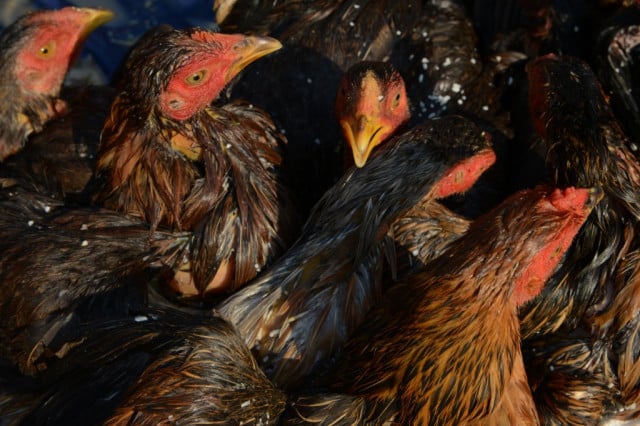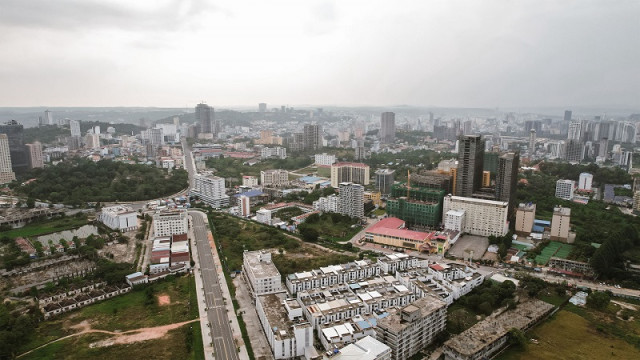Students Bet on Technology to Modernize Aquaculture in Cambodia

- By Te Chhaysinh
- August 19, 2023 9:14 AM
PHNOM PENH – Young Cambodians are developing a new device and its associated app to modernize the aquaculture sector in Cambodia and strengthen the use of the Internet of Things (IoT) in the country.
A group of university students from the National University of Management and Paragon International University developed in late 2021 a system called FlexFloc to help monitor the quality of water in small-to-large-scale aqua farms.
Surfing the wave of IoT, their system consists of a probe immersed in a basin that measures the water temperature, the oxygen and the pH levels to ensure optimum water quality in fish farming. Once collected, the data is then sent to a smartphone, using the local internet service available – either wifi or 4G – to help producers take appropriate measures if necessary.
The system is particularly useful for Biofloc farming, a widely spread aquaculture technique in which fish are kept in large concrete or plastic pools. Maintaining clean water at all times is essential to ensure the proper development of fish and the profitability of the business.
Before FlexFloc, Cambodian aquaculture farmers had to bring water samples to the lab to get them tested, but the students’ new device and app bring the information directly to the operator’s pocket.
Ngoun Huyteang, a fresh graduate from Paragon University, said that her team developed this device because they realized technology could help support Cambodia’s food sector and they desired to modernize aquaculture.
“We saw there is less focus on that sector in terms of IoT solutions and the technology itself to solve the problem of the farmers,” she said. “That’s why we want to be a part of the people's efforts to modernize aquaculture in Cambodia.”
She said that the importance of modernizing aquaculture through Biofloc and IoT technology aligns with the country's goals for economic growth, food security, and environmental sustainability.
“A key part of modernizing aquaculture is ensuring safe food in large enough quantities. By adopting advanced aquaculture techniques, Cambodia can consistently produce high-quality fish, reducing the need for imports and meeting the country's nutritional needs effectively,” she said.

While there were only four when they started the project two years ago, the team has now grown to six members, most of whom still being students.
The team has received support from the Ministry of Agriculture, Forestry, and Fisheries as well as the Fisheries Administration. They provided them with aquaculture specialists to share knowledge and fish farming techniques, so that their device matches the industry’s reality.
Despite the support, the students had to overcome obstacles along the way. The first was time management. With a very busy schedule, they so far had few opportunities to go to the field and meet aquaculture farmers to better understand their problems and how to solve them.
They also had to convince them that technology could be one of the answers to make their life easier. While many farmers are still unfamiliar with technology and remain attached to traditional methods, some raised concerns over the cost of implementing and maintaining the technology, as well as uncertainties about its benefits, effectiveness, and internet connection.
Huyteang said that to address these challenges, her team is ready to provide farmers with comprehensive training and education about the technology's benefits and usage, which is crucial. Workshops, demonstrations, and user-friendly guides can help build their confidence and competence in using the technology effectively.
To make sure that user interfaces and training materials are easy to use, they will write them in Khmer, which can significantly improve farmers’ understanding of their technology. If the project were to become widespread, the team also plans to set up a helpline or online forum to address the farmers’ day-to-day issues.
Implementing pilot projects in collaboration with farmers can help identify challenges and gather feedback, leading to technology that better meets their needs, Huyteang added.
Currently, the application is still in the development and improvement phase. The team also plans to develop an offline mode, to allow the system to work in remote areas where the internet connection is not stable.
FlexFloc probe would collect in real-time but only send it to the producer’s smartphone when the internet is available.















